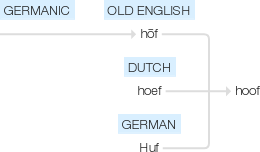Hoof
Old English hōf, of Germanic origin; related to Dutch hoef and German Huf .
wiktionary
From Middle English hoof, hof, from Old English hōf, from Proto-Germanic *hōfaz (compare West Frisian hoef, Dutch hoef, German Huf, Danish hov, Norwegian hov, Swedish hov), from Proto-Indo-European *ḱoph₂ós (compare Sanskrit शफ(śaphá, “hoof, claw”), Avestan 𐬯𐬀𐬟𐬀 (safa, “hoof”), possibly Czech, Polish kopyto).
etymonline
hoof (n.)
Old English hof "hoof," from Proto-Germanic *hōfaz (source also of Old Saxon, Old Frisian hof, Old Norse hofr, Danish hov, Dutch hoef, German Huf "hof"), perhaps from PIE *kop- "to beat, strike" (source also of Sanskrit saphah "hoof," Polish kopyto "hoof;" see hatchet (n.)). But Boutkan acknowledges only Indo-Iranian cognates and writes, "We may be dealing with a typical relic form that only survived in the periphery of the IE area ...." For spelling, see hood (n.1).
A hoof differs from a nail or claw only in being blunt and large enough to inclose the end of the limb; and almost every gradation is to be found between such structures as the human nails, or the claws of a cat, and the hoofs of a horse or an ox. The substance is the same in any case, and the same as horn, being modified and greatly thickened cuticle or epidermis. [Century Dictionary]
Hoof-and-mouth disease is attested from 1866. Phrase on the hoof is from 1750 as "walking;" later it was cattlemen and butchers' slang for "not (yet) slaughtered."
hoof (v.)
"having hoofs (of a specified kind)," c. 1500 in compounds, from hoof (n.). Meaning "to walk" (as in hoof it) is from 1640s; slang meaning "to dance" is 1920, American English (implied in hoofer). Related: Hoofing.
